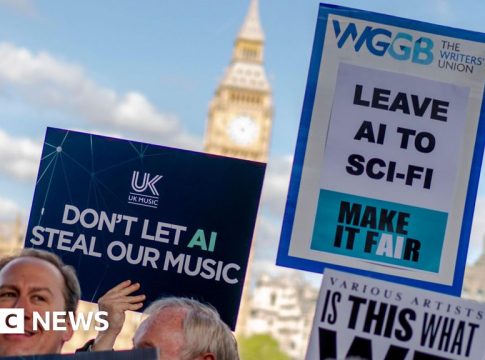Clash Over AI Copyright: A Battle for Creative Rights
The UK’s ongoing debate over artificial intelligence (AI) copyright laws has reached a fever pitch, igniting protests from creative professionals and a fierce standoff in Parliament. As the government pushes forward with its Data (Use and Access) Bill, concerns loom over how it may impact the livelihoods of artists, writers, and musicians.
The Core of the Issue
At the heart of this conflict lies the balance between the tech and creative industries. The government argues that AI developers should have access to a broad range of copyrighted material—unless content owners explicitly opt out. This approach, they believe, aims to foster innovation in AI technologies. However, many creators see it as a threat to their rights and income, believing it allows for what they term "state-sanctioned theft."
Prominent figures, including former film director Baroness Beeban Kidron, have voiced strong opposition. Kidron asserts that advancing AI at the expense of creators could decimate a thriving UK creative sector, valued at an impressive £124 billion. She and others are pushing for amendments that would require transparency from AI firms regarding the copyrighted materials they utilize for training.
The Government’s Stance
Supporters of the government’s position, including tech industry leaders like Sir Nick Clegg of Meta, argue that requiring permission from every copyright holder would drastically stifle the growth of the UK AI market. Clegg warns that stringent regulations could drive investments overseas, ultimately harming the nation’s competitiveness in an increasingly tech-driven global landscape.
Yet this viewpoint hasn’t quelled the growing resistance. Recent parliamentary debates show little sign of compromise, with the opposition gaining momentum rather than dwindling. The ping-ponging of the bill between the House of Commons and House of Lords suggests a drawn-out battle ahead.
Historical Context and Future Implications
The roots of this controversy can be traced back to the early days of AI development, when companies often scraped vast amounts of content online—arguing that it fell within the realm of public domain. The launch of innovative AI tools equipped with the ability to create text, art, and music from existing works has since sparked outrage among content creators.
High-profile artists like Sir Elton John and Dua Lipa have voiced their concerns, insisting that the unchecked use of their work without consent or compensation equates to exploitation. This raises critical questions about the sustainability of artistic careers in a world increasingly dominated by automated content creation.
Moving Forward: What’s at Stake?
As the UK grapples with these evolving issues, the outcome of this legislative tussle will have significant ramifications. If the Data Bill stagnates or fails to address the needs of creative professionals, it could jeopardize not only individual livelihoods but also the broader landscape of artistic innovation.
Both sides must navigate uncharted waters, balancing technological advancement with the necessity of protecting intellectual property rights. As AI continues to expand its role in our daily lives, striking the right balance will be pivotal in shaping the future of both industries.
The clock is ticking, and the resolution of this conflict may very well dictate the trajectory of the creative landscape for the foreseeable future.

Writes about personal finance, side hustles, gadgets, and tech innovation.
Bio: Priya specializes in making complex financial and tech topics easy to digest, with experience in fintech and consumer reviews.

